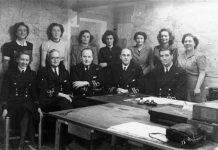Today is Friday, April 22, the 113th day of 2016. There are 253 days left in the year.
Highlights in history on this date:
1500 – Portuguese navigator Pedro Alvares Cabral is the first European to discover Brazil, putting ashore in what today is Porto Seguro.
1509 – Henry VIII becomes king of England following the death of his father, Henry VII.
1529 – Treaty of Saragossa defines interests of Spain and Portugal in the Pacific; Spain gives up claim to the East Indies.

1821 – Greek Patriarch of Constantinople is slain by Turks as reprisal for Greek massacre of Turks in the Peloponnese.
1822 – Turkish fleet captures island of Chios off Greece and massacres Christian inhabitants or sells them as slaves.
1864 – Congress authorizes the use of the phrase “In God We Trust” on U.S. coins.
1889 – American homesteaders swarm into the Oklahoma territory; staking claim to free land.
1898 – The first shot of the Spanish-American War rings out as the USS Nashville captures a Spanish merchant ship off Key West, Florida.
1915 – In first reported use of gas in a conflict, German army releases a cloud of chlorine that causes havoc among French troops at Ypres, Belgium.
1931 – Egypt and Iraq sign treaty of friendship — the first pact between Egypt and another Arab state.
1945 – Allied forces take Bologna in Italy during World War II.
1956 – China appoints Dalai Lama chairman of committee to prepare Tibet for regional autonomy within Chinese People’s Republic.
1970 – Millions of Americans concerned about the environment observe the first “Earth Day.”
1975 – First Vietnamese refugees arrive on U.S. West Coast while South Vietnam is falling to communists.
1990 – Pro-Iranian kidnappers in Lebanon free American hostage Robert Polhill after nearly 39 months of captivity.
1991 – A strong earthquake hits Costa Rica, causing extensive damage throughout that country and in western Panama.
1992 – Gasoline leaked from a nearby refinery explodes in the sewer system of Guadalajara, Mexico, ripping open streets and killing 194 people.
1993 – A military court in Cairo sentences to death 7 of 49 Islamic militants for attacks against tourists.
1995 – Hutu refugees flee the refugee camp at Kibeho, Zaire, after thousands are gunned down by soldiers or trampled to death in stampedes.
1996 – Italy takes a turn to the left as a coalition of parties dominated by former Communists wins legislative majorities.
1997 – Peruvian troops storm the Japanese ambassador’s mansion in Lima, Peru, and rescue 72 hostages held for four months, but one dies on the way to the hospital. All 14 Tupac Amaru rebels and two soldiers die in the shootout.
1998 – Despite a last-minute plea from the president of Honduras, the U.S. state of Arizona executes a Honduran citizen for murder.
1999 – NATO destroys Yugoslav President Slobodan Milosevic’s home in Belgrade with bombs, claiming it is part of his military machine.
2000 – Six-year-old Elian Gonzalez is reunited with his father after a frantic and forceful end to a five-month standoff between the U.S. government and the Cuban boy’s Miami relatives.
2002 – All four defendants on trial for the kidnapping and murder of U.S. journalist Daniel Pearl plead not guilty as the trial begins in Karachi, Pakistan. The accused face the death penalty.
2003 – France calls for the immediate suspension of most U.N. sanctions against Iraq, allowing civilian trade to resume, as well as commercial air travel and the revival of the financial securities industry
2005 – Belarus’ authoritarian President Alexander Lukashenko thanks Russia for supporting his isolated nation amid mounting U.S. criticism, and emphasizes the need for closer military cooperation between the two ex-Soviet allies.
2006 – Hundreds are injured in Katmandu when Nepali security open fire on tens of thousands of protesters marching toward the royal palace in defiance of a curfew, as opposition leaders reject the king’s proposals for restoring democracy.
2007 – Gunmen execute 23 members of the ancient Yazidi religious sect in northern Iraq after stopping their bus and separating out followers of other faiths.
2008 – The office of Colombia’s chief prosecutor orders the arrest of President Alvaro Uribe’s cousin over alleged links to paramilitary gangs.
2009 – Taliban militants extend their grip in northwestern Pakistan, pushing out from a valley where the government has agreed to impose Islamic law and patrolling villages as close as 60 miles (96 kilometers) from the capital.
2010 – President Barack Obama rebukes Wall Street for risky practices even as he seeks its leaders’ help for “updated, commonsense” banking regulations to head off any new financial crisis.
2011 – Syrian security forces fire bullets and tear gas at tens of thousands of protesters across the country, killing at least 75 people in the bloodiest day of the monthlong uprising and signaling that the authoritarian regime is prepared to turn more ruthless to put down the revolt against President Bashar Assad.
2012 – The U.S. and Afghanistan reach a deal on a long-delayed strategic partnership agreement that ensures Americans will provide military and financial support to the Afghan people for at least a decade beyond 2014, the deadline for most foreign forces to withdraw.
2013 – A seriously wounded Dzhokhar Tsarnaev is charged in his hospital room with bombing the Boston Marathon in a plot with his older brother and could get the death penalty for an attack that killed three people and wounded more than 200. Their family moved to the United States from Chechenya more than a decade ago.
2014 – Weakened Syrian rebels make their last desperate stand in Homs, as forces loyal to President Bashar Assad launch their harshest assault yet to expel them from the central city, once known as the capital of the revolution.
2015 – Saudi Arabia resumes airstrikes against Shiite Houthi rebels in Yemen, hours after announcing an end to its nearly month-long bombing campaign. The airstrikes resumed after rebels gained ground in the central city of Taiz.
Today’s Birthdays:
Henry Fielding, English author (1707-1754); Immanuel Kant, German philosopher (1724-1804); Vladimir Lenin, Russian statesman (1870-1924); Sir Yehudi Menuhin, U.S.-born violinist (1916-1999); Sir Sidney Nolan, Australian artist (1917-1993); Aaron Spelling, U.S. television producer (1923-2006); Alan Bond, Australian entrepreneur and America’s Cup sponsor (1938-2015); Jack Nicholson, U.S. actor (1937–); John Waters, U.S. director (1946–); Peter Frampton, British rock singer (1950–).
Thought For Today:
We are what we pretend to be, so we must be careful about what we pretend to be — Kurt Vonnegut, U.S. author (1922-2007).
Copyright 2016 The Associated Press. All rights reserved. This material may not be published, broadcast, rewritten or redistributed.




